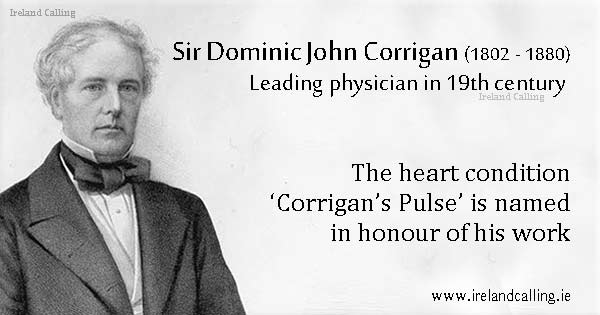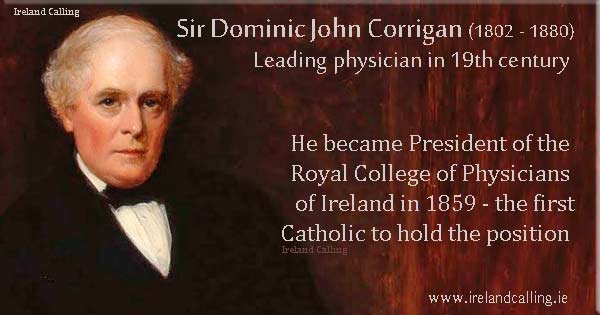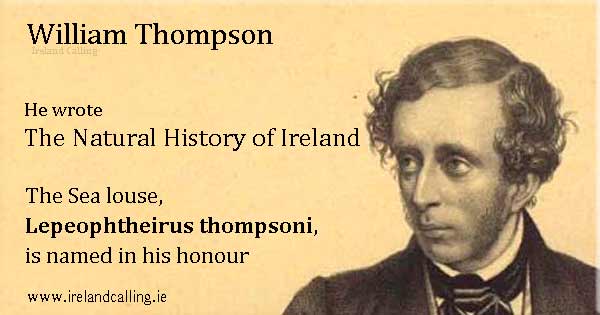december-top.html
1802 Sir Dominic John Corrigan was born in Dublin on this day in 1802. He was a leading physician in the 19th century and his study of the heart was the basis for great medical advances.
A heart deficiency of a collapsing pulse in the aortic valve is named ‘Corrigan’s Pulse’ in honour of his work.
Corrigan studied medicine in Dublin before moving to Edinburgh to complete his education. He graduated in 1825 and set up his own practice in Dublin.
As well as running his practice, Corrigan also worked on a number of external projects, including offering medical treatment to the poor and homeless in Dublin.

Because he worked treating many homeless people, Corrigan became specialised in diseases relating to the heart and lungs, which many of his patients suffered. He frequently gave lectures to other medical professionals and students on the subjects.
Corrigan became a fellow of the Royal College of Physicians of Ireland in 1856. This was despite being initially rejected. Corrigan got round these objections by sitting the entrance exam with young student doctors to gain his position as a member. He was elected as the President just three years later, the first Catholic to hold the position,
Corrigan also had a brief career in politics when he was elected as Dublin’s Liberal member of parliament. His main concern was for improved education systems to be put in place and that was the focus of much of his work.
He stepped down as MP after four years, having lost much of his support because of his proposed Sunday closing of pubs.

* * *
1805 William Thompson was born in Belfast on this day in 1805. He studied Biological Science and travelled across Europe observing and recording the behaviour of a variety of birds.
Thompson’s father was a wealthy linen merchant, and funded many of his early expeditions.
Thompson returned to Ireland and continued to study birds, publishing several papers on the various species in Ireland. He also kept several rarer species in an aviary to observe closely.

He wrote The Natural History of Ireland (four volumes) between 1849 and1856. The titles are;
Volume 1: Birds, comprising the orders raptores and insessores (1849)
Volume 2: Birds, comprising the orders rasores and grallatores (1850)
Volume 3: Birds, comprising the order natatores (1851)
Volume 4: Mammalia, reptiles and fishes. Also, invertebrata (1856)
The Sea louse Lepeophtheirus thompsoni, 1850 honours his name.
Click here to read about more great Irish scientists
* * *
1932 Harry McDaniel died on this day in 1932. He was a Welsh rugby player and is noteworthy because he made his one and only international appearance against Wales, for Ireland.
The Irish team were two players short when they travelled to Wales for a Home Nations Championship match in 1884. McDaniel and Charles Jordan threw their national patriotism to one side and stepped up to pull on the green jersey and make it a level game.
Unfortunately, they couldn’t help the Irish to a victory over their home country though, with the Welsh winning the game by one try and one drop goal to nil.
Click here to read about some more accomplished Irish sports stars
* * *
1966 Giles Cooper died on this day in 1966 after he fell from a moving train in Surrey, England. He was a writer and broadcaster who had worked for the BBC as a radio script writer.
Cooper was born in Dublin 1918. He studied art and acting in London before being called up to the British Army during the Second World War. He served for three years in the jungles of Burma.
After the war had finished, Cooper returned to London and became a key part of the BBC’s writing team. He wrote radio and television adaptions of literary classics including Oliver Twist, Les Miserables, Sherlock Holmes and Day of the Triffids.
A post-mortem on Cooper’s body revealed he had drank an estimated half a bottle of whiskey before his death. Theories were put forward that Cooper had committed suicide, which were dismissed by his friends and family. The coroner’s verdict on the death was misadventure.
Click here to read about more Irish writers
* * *
1999 The Good Friday Agreement officially came into force on this day in 1999. The handover of power of Northern Ireland from London to the new Northern Ireland Assembly was broadcast live on television.
British Secretary of State for Northern Ireland Peter Mandelson and Irish Minister for Foreign Affairs David Andrew exchanged notifications before Taoiseach Bertie Ahern signed the declaration and announced to the Dáil that the British-Irish Agreement had entered into force.
It was hoped the agreement would bring an end to the ‘Troubles’ in Northern Ireland which had plagued the country for more than three decades.

* * *
2004 Margaret Dolan of Galway passed away on this day in 2004. She was 111 years old and recognised as the oldest person in Ireland. ‘Maggie’, as she was known to her friends, attributed her long life to a youthful spirit and an active mind. She never smoked or drank alcohol and was a keen reader. Her life was celebrated in the Irish newspapers the following day.
december-bottom.html